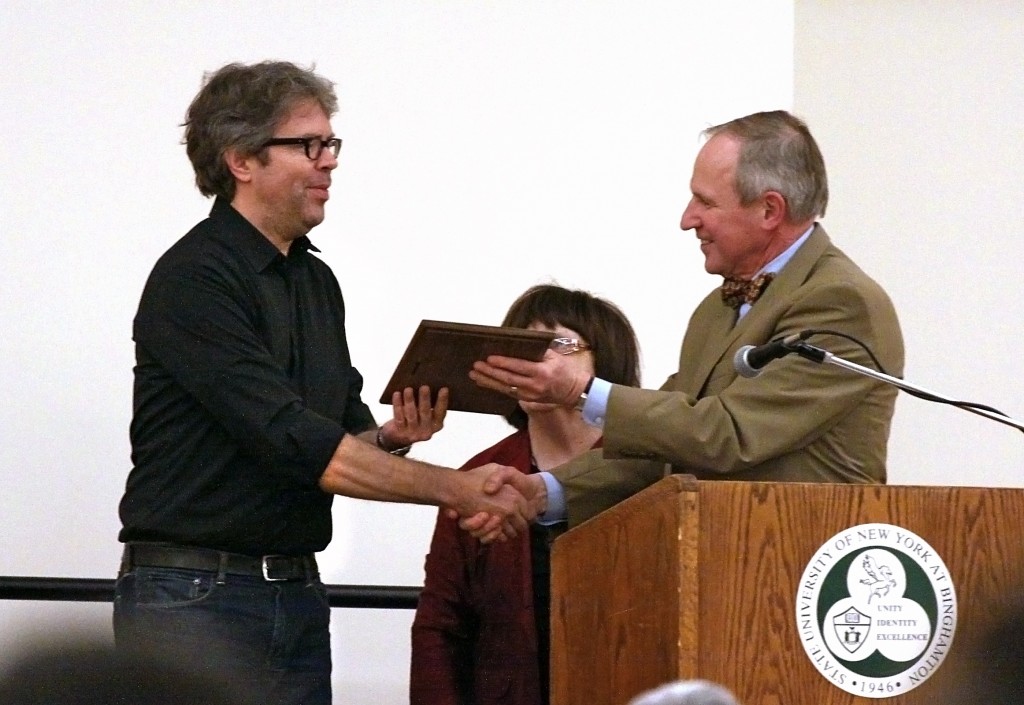
Jonathan Franzen, National Book Award winner, Pulitzer Prize finalist and this year’s recipient of Binghamton University’s John Gardner Fiction Book Award for his most recent novel, “Freedom,” visited BU on Wednesday to perform a reading from his book. Prior to the event, Franzen sat down with students enrolled in ENG 594A: “Writers and Other Artists” for a question-and-answer session. Pipe Dream was offered the opportunity to sit in on the session.
Ariella Grossman, junior double-majoring in English and history: Freedom is written in three different writers’ voices, mainly Walter’s, Joey’s and Patty’s. How did you manage to keep track of each character’s distinct personality and story?
Franzen: I think that part of writing is akin to acting in some way, you know? If you get down on your hands and knees and you try to imitate a dog there’s something mimetic in the human being. You sort of become a dog as you’re imitating a dog. And it’s not different, I think, if you really know who the character is and you put yourself in that mind and you are just — boy is that not very helpful. On the other hand it was a hard question.
Katherine Hartnett, senior majoring in creative writing: Do you have any advice for young writers? How did you get published?
Franzen: I had a university research job and lived in a student slum for five years. You know — my wife and I got married very young — two could live cheaper than one. I don’t recommend that part necessarily. I was really terrified of failure because my parents were Depression-era parents, and they were so concerned that I would not make a living. And so I just worked really, really hard in my 20s to get a book that I could sell for at least a little bit of money to show them I’m going to be OK. And I really, you know, we lived on five-pound bags of rice and jugs of a gallon of wine and 24 packs of chicken thighs from the lowest-tier supermarket, bought two days before the — or one day before — sell-by date. And, we definitely trolled the, you know, fruits and vegetables that were marked way down, and wrapped, and there was only a little bit of them, and they were starting to go bad. You can get them for about a quarter the price. You know, it was crazy. We were insanely cheap, but it was all made possible by relatively low rents and the proximity of these research jobs that they sort of leave you alone. So that was my way and the other thing that I did was I read. Really, really read. Everything. That’s how I spent my 20s — and much of my 30s — but especially my 20s. Just read for four hours every night. I think reading lots of different kinds of things from different eras — I know that’s not, like, how to get published — but in a way it is. Because, I mean, where did these young movie directors come from who are so good? They come from having watched everything, and I find that’s part of it. And the rest of it is to just find a couple of readers who you trust, and who will be really hard on you — who love you enough to tell you the truth about what’s boring, what’s not working.
Christian Flaim, a first-year graduate student: As an athlete I have many rituals that I do before I am able to compete. As an author do you have any rituals or superstitions for your writing process?
Franzen: I put the pine tar on the bat. I like to start making crosses in the dirt before I put my first foot in (laughs); adjust the velcro on my hitting gloves. Superstitions? I can’t write if I let any amount of time go between breakfast and sitting down. I have to write in the morning. If I wait an hour, if I check my email — I can probably get away with checking for one thing and replying if it’s urgent — and then I have to go straight to writing or else it’s not going to happen. Anything else? I like a dark, cold room — dark, cold, silent room. I think it’s not a bad idea to try — and I think I do this more and more — to sort of stop writing in the middle of a sentence. Certainly you’re setting yourself up for a bad day the next day if you push on to the end of a section and end at a definitive point with nothing but blankness after that. Because then it’s tempting to just go in and rewrite what you did the day before and there’s nothing sort of pulling you forward. So having kind of a mess at the end, I think is helpful. So that way there’s still stuff happening here, and then I can go in and I can kind of get involved and ease into the work the next day.
PD: You’ve now written a screenplay adaptation of your novel “The Corrections.” What is different about writing screenplays?
Franzen: Screenplays are fun because they’re so much about structure, and the scripts I’ve been writing — I just wrote 10 of them — I didn’t have to worry about inventing the story or the characters because I already had that. And they’re also fun because they’re written very quickly. But they’re awful because they’re subject to infinite revisions and they’re not really a finished product.
PD: Thank you.
Franzen: You know, I’ve never been to Binghamton before. But I know it’s kind of the flagship school — and I’ve heard good things about the students here — and nothing in the last hour and a half has changed my mind. You guys were great.


